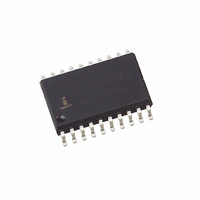EL7571CMZ Intersil, EL7571CMZ Datasheet - Page 10

EL7571CMZ
Manufacturer Part Number
EL7571CMZ
Description
IC CTRLR PWM PROGRAMMABLE 20SOIC
Manufacturer
Intersil
Datasheet
1.EL7571CM.pdf
(19 pages)
Specifications of EL7571CMZ
Applications
Controller, Intel Pentium® II, Pro
Voltage - Input
4.5 ~ 12.6 V
Number Of Outputs
2
Voltage - Output
1.3 ~ 3.5 V
Operating Temperature
0°C ~ 70°C
Mounting Type
Surface Mount
Package / Case
20-SOIC (7.5mm Width)
Lead Free Status / RoHS Status
Lead free / RoHS Compliant
Input Capacitor, C
In a buck converter, where the output current is greater than
10A, significant demand is placed on the input capacitor.
Under steady state operation, the high side FET conducts
only when it is switched “on” and conducts zero current when
it is turned “off”. The result is a current square wave drawn
from the input supply. Most of this input ripple current is
supplied from the input capacitor C
through C
the capacitor and cause premature failure. Maximum input
ripple current occurs when the duty cycle is 50%, a current
of I
Worst case power dissipation is:
where:
For safe and reliable operation, P
capacitor’s data sheet rating.
Input Inductor, L
The input inductor (L
input supply line by diverting buck converter input ripple
current into the input capacitor. Buck regulators generate
high levels of input ripple current because the load is
connected directly to the supply through the top switch every
cycle, chopping the input current between the load current
and zero, in proportion to the duty cycle. The input inductor
is critical in high current applications where the ripple current
is similarly high. An exclusively large input inductor degrades
the converter’s load transient response by limiting the
maximum rate of change of current at the converter input. A
1.5µH input inductor is sufficient in most applications.
Output Capacitor, C
During steady state operation, output ripple current is much
less than the input ripple current since current flow is
continuous, either via the top switch or the bottom switch.
Consequently, output capacitor power dissipation is less of a
concern than the input capacitor’s. However, low ESR is still
required for applications with very low output ripple voltage
or transient response requirements. Output ripple voltage is
given by:
where:
During a transient response, the output voltage spike is
determined by the ESR and the equivalent series inductance
ERS
I
ESR
RIP
OUT
IN
= output ripple current
OUT
/2 RMS.
= input capacitor ESR
1
’s equivalent series resistance (ESR) can heat up
= output capacitor ESR
V
P
2
RIP
D
2
1
) isolates switching noise from the
=
2
=
I
------------ -
OUT
I
2
RIP
10
2
×
•
ESR
D
ESR
1
must be less than the
. The current flow
OUT
IN
EL7571
(ESL) of the output capacitor in addition to the rate of change
and magnitude of the load current step. The output voltage
transient is given by:
where:
Power MOSFET, Q
The EL7571 incorporates a boot-strap gate drive scheme to
allow the usage of N-channel MOSFETs. N-channel
MOSFETs are preferred because of their relative low cost
and low on resistance. The largest amount of the power loss
occurs in the power MOSFETs, thus low on resistance
should be the primary characteristic when selecting power
MOSFETs. In the boot-strap gate drive scheme, the gate
drive voltage can only go as high as the supply voltage,
therefore in a 5V system, the MOSFETs must be logic level
type, V
source threshold, the gate to source capacitance is also very
important. In the region when the output current is low
(below 5A), switching loss is the dominant factor. Switching
loss is determined by:
where:
Another undesirable reason for a large MOSFET gate to
source capacitance is that the on resistance of the MOSFET
driver can not supply the peak current required to turn the
MOSFET on and off fast. This results in additional MOSFET
conduction loss. As frequency increases, this loss also
increases which leads to more power loss and lower
efficiency.
Finally, the MOSFET must be able to conduct the maximum
current and handle the power dissipation.
The EL7571 is designed to boot-strap to 12V for 12V only
input converters. In this application, logic level MOSFETs
are not required.
The following table below lists a few popular MOSFETs and
their critical specifications.
ESR
ESL = output capacitor ESL
∆I
d
C is the gate to source capacitance of the MOSFET
V is the supply voltage
F is the switching frequency
i
/d
OUT
t
OUT
= rate of change of output current
GS
= output current step
<4.5V. In addition to on resistance and gate to
∆V
= output capacitor ESR
OUT
=
ESR
1
P
and Q
=
OUT
C
×
×
2
V
∆I
2
×
OUT
F
+
ESL
×
---- -
d
d
t
i











